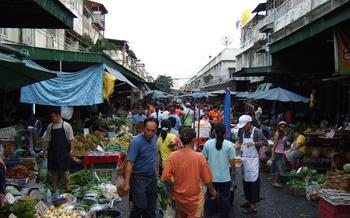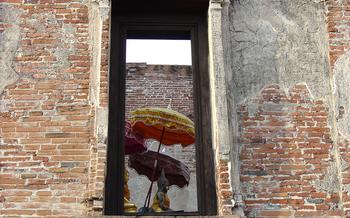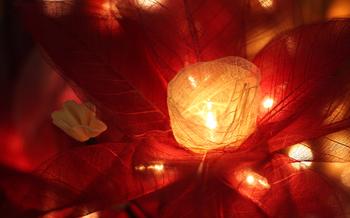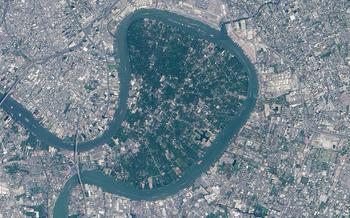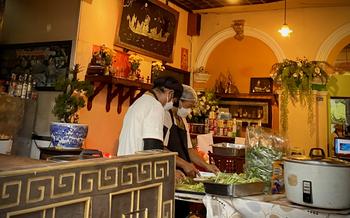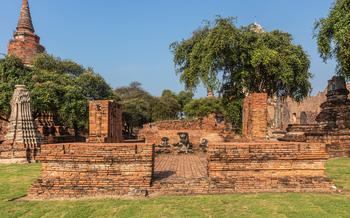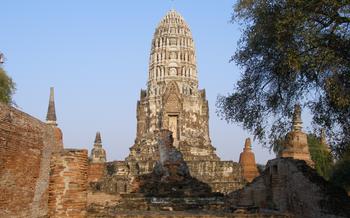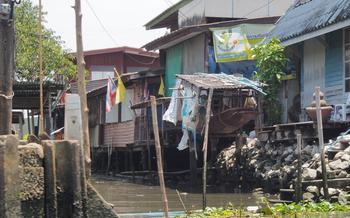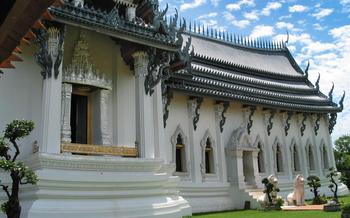
Don Wai Floating Market in nearby Nakhon Pathom
- Don Wai Floating Market: A Unique Experience
- Getting There: A Convenient Journey
- Navigating the Market
- Must-Try Delicacies
- Floating Market Experience
- Shopping for Souvenirs at Don Wai Floating Market
- Cultural Performances
- Visiting Nearby Attractions
- Local Customs and Etiquette
- Avoiding Tourist Traps
- Best Time to Visit
- Photography Tips: Capturing the Essence of Don Wai
- Staying Hydrated and Protected
- Local Accommodation: A Unique Experience
- Insider Tip: Hidden Gems
Don Wai Floating Market: A Unique Experience
The Don Wai Floating Market is a vibrant and bustling destination located in the nearby province of Nakhon Pathom, just a short trip from Bangkok. This unique market has its roots in the traditional Thai way of life, where vendors would sell their goods from boats along the canals. Over time, it has evolved into a cultural and economic hub, drawing both locals and tourists alike.
Visiting the Don Wai Floating Market offers a glimpse into the rich heritage of Thailand's floating markets. It's a place where you can experience the authentic charm of local life, interact with friendly vendors, and savor delicious Thai cuisine. Whether you're looking for a unique cultural experience or simply want to explore a different side of Thailand, the Don Wai Floating Market is a must-visit destination.
My first visit to the market left an unforgettable impression. As I navigated the narrow canals in a small boat, I was surrounded by a kaleidoscope of colors and sounds. Vendors displayed their wares on boats, their voices calling out to potential customers. The air was filled with the tantalizing aroma of freshly cooked food, blending with the gentle lapping of water against the boats. It was a truly immersive experience that transported me back in time.
Getting There: A Convenient Journey
Reaching the Don Wai Floating Market from Bangkok is a breeze, with several transportation options available to suit every traveler's needs and budget. For those who prefer a comfortable and direct journey, joining an organized tour is a great choice. These tours typically include round-trip transportation from Bangkok, eliminating the hassle of navigating public transport or driving yourself. Alternatively, for a more independent adventure, you can take a public bus or train to Nakhon Pathom and then catch a local songthaew (shared taxi) or tuk-tuk to the market. The journey takes approximately 1-2 hours, depending on traffic conditions.
To make the most of your trip, plan to arrive at the market early in the morning when it's less crowded and the weather is cooler. This will allow you to soak in the vibrant atmosphere and capture stunning photos without having to jostle through throngs of people. Additionally, consider visiting on a weekday if possible, as weekends tend to be busier with both local and foreign tourists.
Navigating the Market
The Don Wai Floating Market is a labyrinth of canals and walkways, each teeming with vendors and customers. The layout is generally organized by product type, with sections dedicated to fresh produce, cooked dishes, souvenirs, and handicrafts. Stalls are often clustered together, creating a vibrant and bustling atmosphere.
One of the unique aspects of the market is the way vendors operate their boats. Many of them use long bamboo poles to propel themselves through the canals, while others simply paddle with their hands. The boats are often laden with colorful fruits, vegetables, and other goods, creating a feast for the eyes.
It's important to remember that the Don Wai Floating Market is a place of business, and vendors are there to make a living. While it's perfectly acceptable to browse and take photos, it's important to be respectful of their time and space. If you're interested in buying something, be sure to ask permission before taking photos or videos of the vendor or their products.
Must-Try Delicacies
The Don Wai Floating Market is a culinary haven, offering a tantalizing array of local dishes and delicacies that are sure to delight your taste buds. Immerse yourself in the vibrant flavors of Thai cuisine as you sample freshly prepared dishes from the many stalls lining the canals.
Indulge in the aromatic delights of Pad Thai, a stir-fried rice noodle dish with a harmonious blend of sweet, sour, and savory flavors. Savor the succulent Tom Yum Goong, a spicy and sour soup brimming with plump shrimp, lemongrass, galangal, and kaffir lime leaves. For a taste of local street food, try the crispy Khanom Buang, a sweet and savory snack made from crispy crepe filled with shredded coconut and caramelized sugar.
Don't miss the opportunity to relish the freshest produce from local farms. Bite into juicy tropical fruits like mangoes, pineapples, and rambutans, or quench your thirst with a refreshing glass of coconut water. Sample the vibrant array of herbs and spices, such as lemongrass, galangal, and kaffir lime leaves, which are essential ingredients in Thai cuisine.
As you navigate the market, be sure to satisfy your sweet tooth with the delectable array of traditional Thai desserts. Indulge in the creamy goodness of mango sticky rice, a classic Thai dessert made with sweet, ripe mangoes and glutinous rice cooked in coconut milk. Try the delicate Khanom Chan, steamed dumplings filled with a sweet mung bean paste, or the crispy Khanom Krok, coconut pancakes with a custard-like filling.
The Don Wai Floating Market is a culinary adventure waiting to be explored. Embrace the vibrant flavors and aromas as you savor the many delights that this unique market has to offer.
Floating Market Experience
The Don Wai Floating Market offers a truly unique and immersive experience that sets it apart from traditional markets. Visitors have the option to rent a boat and navigate the narrow canals, getting up close to the vendors and their wares. Alternatively, they can stroll along the wooden walkways that line the canals, taking in the vibrant sights and sounds of the market.
One of the highlights of the floating market is the opportunity to witness the lively interactions between vendors and customers. Vendors skillfully maneuver their boats, displaying their goods and engaging in friendly banter with passersby. The air is filled with the sounds of haggling, laughter, and the gentle lapping of water against the boats.
For those seeking a truly authentic experience, engaging with the locals and vendors is essential. Don't hesitate to strike up a conversation, ask questions about their products, or simply exchange smiles. The locals are known for their warmth and hospitality, and they are always happy to share their stories and traditions with visitors.
In addition to the bustling market atmosphere, visitors can also find handmade crafts and souvenirs from local artisans. These unique items, ranging from intricate pottery to colorful textiles, are a testament to the skill and creativity of the local community. Bargaining is a common practice at the market, so don't be afraid to negotiate a fair price for the items that catch your eye.
Shopping for Souvenirs at Don Wai Floating Market
The Don Wai Floating Market is a treasure trove for souvenir hunters, offering a wide array of unique and locally made items. From intricate handicrafts to delectable local products, there's something for every taste and budget.
Handicrafts:
Strolling through the market, visitors will be captivated by the colorful displays of handmade crafts, including pottery, textiles, and wood carvings. Skilled artisans showcase their talents, creating one-of-a-kind pieces that reflect Thai culture and traditions. From delicate ceramic bowls to intricately carved wooden sculptures, these handicrafts make for meaningful souvenirs that will remind you of your time at the market.
Local Products:
In addition to handicrafts, the market offers a variety of local products that are not easily found elsewhere. Coconut oil, extracted from fresh coconuts, is a popular choice for its culinary and cosmetic properties. Dried fruits, such as mangoes, pineapples, and bananas, are a delicious and healthy snack option. Visitors can also find a variety of spices, such as turmeric, chili, and lemongrass, to add an authentic Thai flavor to their home cooking.
Haggling Tips:
When shopping at the Don Wai Floating Market, haggling is not only acceptable but expected. It's a fun and interactive way to engage with the vendors and get a good deal on your purchases. However, it's important to be respectful and polite during negotiations. Start by offering a price that is lower than the asking price, and be prepared to walk away if the vendor is not willing to negotiate. Remember, the goal is to find a fair price for both parties involved.
Cultural Performances
The Don Wai Floating Market is not just a place for shopping and dining; it's also a venue for showcasing traditional Thai culture. Visitors can enjoy live performances of traditional Thai music, which often feature melodious string instruments like the khene or the phin. These performances create a lively atmosphere and transport visitors to another era.
Occasionally, dance shows are also held at the market, showcasing the grace and elegance of Thai dancers. These performances depict traditional stories and legends, offering a glimpse into Thailand's rich cultural heritage.
Throughout the year, the market also hosts special festivals and events that celebrate Thai traditions and customs. These events often feature elaborate decorations, colorful parades, and lively performances, providing visitors with a truly immersive cultural experience.
Visiting Nearby Attractions
Beyond the bustling market, visitors can explore several nearby attractions that offer a glimpse into the region's rich history and culture. One must-visit destination is Wat Prayoon Wongsawat, a stunning temple renowned for its towering golden Buddha statue. The 45-meter-tall Phra Pathom Chedi, one of Thailand's tallest stupas, is another architectural marvel located a short distance from the market. For those seeking a unique cultural experience, the Rose Garden, with its elaborate gardens, cultural performances, and elephant shows, is a popular choice. These attractions provide a perfect opportunity to delve deeper into the region's heritage and create lasting memories.
Local Customs and Etiquette
When visiting the Don Wai Floating Market, it is essential to be respectful of local customs and traditions. Thailand is a predominantly Buddhist country, and visitors should be mindful of their behavior and dress accordingly. When visiting temples or sacred sites, it is customary to remove shoes and dress modestly. It is also considered disrespectful to point your feet at Buddha statues or images.
When interacting with locals, a smile and a wai (a traditional Thai greeting) go a long way. The wai is performed by placing your hands together in a prayer-like position and bowing slightly. It is a sign of respect and should be used when greeting elders, monks, or people in positions of authority.
As for dress code, it is advisable to wear comfortable, lightweight clothing that covers your shoulders and knees. This is especially important when visiting temples or other sacred sites. While it is not necessary to wear traditional Thai clothing, dressing respectfully will help you blend in with the locals and show respect for their culture.
Communication can sometimes be a challenge, as not all vendors or locals may speak English fluently. However, most people will be willing to help you if you are patient and polite. It is helpful to learn a few basic Thai phrases, such as "hello" (sa-wat-dee), "thank you" (khob-khun), and "goodbye" (la-korn).
Avoiding Tourist Traps
Navigating tourist destinations can sometimes lead to encountering overpriced souvenirs, fake products, and guided tours that may not offer the best value for money. To avoid these pitfalls, it's important to be informed and cautious.
When shopping for souvenirs, don't hesitate to bargain with vendors. Politely negotiating prices is a common practice in Thailand, and you can often get a fair deal if you're willing to haggle. Be wary of souvenirs that seem excessively expensive, as they may be overpriced.
Beware of counterfeit goods, especially when it comes to branded items. While it's possible to find genuine branded products at the market, it's also common to encounter fake versions. To avoid disappointment, carefully inspect the products and consider purchasing from reputable shops or stalls.
If you're considering joining a guided tour, do some research beforehand to ensure that you're getting a good deal. Read reviews, compare prices, and ask questions about the tour itinerary and inclusions. Guided tours can be a convenient option for those who prefer a structured experience, but exploring the market independently allows for more flexibility and the opportunity to discover hidden gems at your own pace.
Best Time to Visit
The best time to visit the Don Wai Floating Market is during the dry season, which runs from November to April. During this time, the weather is generally pleasant, with sunny skies and low humidity. This makes it ideal for exploring the market and enjoying the outdoor activities.
To avoid the crowds, it's advisable to visit the market on a weekday rather than a weekend. Early mornings are also a good time to go, as the market is less crowded and the vendors are more likely to offer better prices.
If you're interested in experiencing the market's vibrant festivals and events, be sure to check the schedule in advance. These events often feature traditional Thai music and dance performances, as well as special food and craft stalls.
Photography Tips: Capturing the Essence of Don Wai
Capturing the Essence:
- Embrace the chaos: Don Wai Floating Market is a vibrant and chaotic place. Embrace this energy and capture the essence of the market by taking photos that showcase the hustle and bustle.
- Experiment with angles: Don't just stick to eye-level shots. Get creative and try different angles to capture unique perspectives of the market.
- Play with light and shadow: The early morning and late afternoon light can create beautiful shadows and reflections on the water. Use this to your advantage to add depth and dimension to your photos.
- Focus on the details: The market is full of interesting details, from the colorful boats to the smiling faces of the vendors. Take your time to explore and capture these details that make the market so special.
Respecting Privacy:
- Ask for permission: Before taking photos of people, always ask for their permission. This is especially important when photographing children or people who are engaged in private activities.
- Be discreet: If someone doesn't want their photo taken, respect their wishes and move on. Don't be intrusive or pushy.
- Avoid taking photos of people's faces without their consent: It's generally considered rude to take photos of people's faces without their permission, especially if they are unaware of it.
Editing and Sharing:
- Edit your photos carefully: Once you've taken your photos, take some time to edit them carefully. This will help you to improve the composition, colors, and overall look of your photos.
- Share your photos responsibly: When sharing your photos on social media, be sure to tag the location and credit the market. This will help to promote the market and encourage others to visit.
Staying Hydrated and Protected
Navigating the bustling Don Wai Floating Market under the scorching Thai sun can be exhilarating but physically demanding. Ensuring your well-being is paramount, so remember to prioritize hydration and protection.
Sun Protection:
The tropical sun can be unforgiving, so come prepared with a reliable sunscreen with a high SPF. Apply liberally and reapply throughout the day, especially after sweating or swimming. Don't forget to protect your head with a wide-brimmed hat and shield your eyes with sunglasses.
Hydration:
Staying hydrated is essential to maintaining your energy levels and overall health. Bring a reusable water bottle and refill it regularly at the market's many water stations. Fresh coconut water, a natural electrolyte drink, is also widely available and highly recommended.
Insect Repellent:
Mosquitoes and other insects can be a nuisance, especially in tropical regions. Pack a DEET-based insect repellent and apply it liberally to exposed skin. Be sure to reapply according to the product's instructions to stay protected throughout your visit.
By following these simple tips, you can ensure a safe and enjoyable experience at the Don Wai Floating Market while embracing the vibrant local culture.
Local Accommodation: A Unique Experience
Immerse yourself in the local culture by staying in a homestay or guesthouse near the Don Wai Floating Market. These accommodations offer a unique opportunity to connect with the community and experience Thai hospitality firsthand. Homestays typically provide simple but comfortable rooms, allowing you to live like a local and learn about their way of life. Guesthouses, on the other hand, offer a wider range of amenities and services, making them a good choice for those seeking more comfort and privacy.
When booking your accommodation, it's advisable to reserve in advance, especially during peak tourist season. However, last-minute options are often available, especially for guesthouses. Be sure to inquire about amenities such as air conditioning, Wi-Fi, and breakfast to ensure a comfortable stay.
Staying in local accommodation offers several advantages. Not only will you save money compared to hotels, but you'll also support the local economy and contribute to sustainable tourism. Moreover, you'll have the chance to practice your Thai language skills and make meaningful connections with the locals.
Insider Tip: Hidden Gems
Beyond the main attractions of Don Wai Floating Market, there are hidden gems waiting to be discovered by adventurous travelers. One insider tip is to venture off the beaten path and explore the smaller canals and side alleys. Here, you might stumble upon secret stalls tucked away from the crowds, offering unique local delicacies or handmade crafts that you won't find anywhere else.
Another way to uncover hidden gems is to engage with the locals. Ask vendors for recommendations on their favorite dishes or lesser-known attractions in the area. They might share insider knowledge about local festivals, traditions, or nearby villages that are worth exploring.
If you have time, consider visiting other local markets in the region. Each market has its own unique character and offers different products and experiences. Some nearby markets worth checking out include the Damnoen Saduak Floating Market, the Amphawa Floating Market, or the Tha Kha Floating Market.
